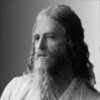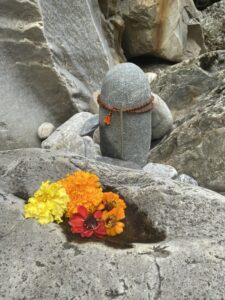The Brahmajñānāvalīmālā, “The Garland of Waves of Divine Consciousness,” is a text composed by Shankara, perhaps the foremost exponent of the non-dual vision of the yoga tradition. This writing exemplifies jnana yoga, the yoga of wisdom. It highlights the unity of all beings, and the divine consciousness that resides in all, and permeates all. Translated and Rendered by Prem Prakash, c. 2020, all rights reserved.
A. Master Shankara, you are known as the foremost teacher of yogic wisdom. I implore you, please instruct me in the teachings of Universal Consciousness.
sakṛcchravaṇamātreṇa brahmajñānaṃ yato bhavet (1a)
sakṛcchravaṇamātreṇa – by listening once
brahmajñānaṃ – wisdom of Universal Consciousness
yato bhavet – arising from this
If you listen attentively just once, the wisdom of Universal Consciousness will arise in you.
A. How can listening just once make this possible?
brahmajñānāvalīmālā sarveṣāṃ mokṣasiddhaye (1b)
brahmajñānāvalīmālā -garland of joyous wisdom of Universal Consciousness
sarveṣāṃ – for all
mokṣasiddhaye – power of liberation
Because this garland of Universal Consciousness is powerful enough to bring liberation to anyone.
A. How could someone as confused as me become liberated?
asaṅgo’ham asaṅgo’ham asaṅgo’haṃ punaḥ punaḥ (2a)
asaṅgo’ham – I am unattached
punah – again
Because you are only bewildered about who you are. Repeatedly contemplate your real Self as being free from all attachments.
A. But I don’t feel free and I can’t seem to release my attachments.
saccidānandarūpo’hamahamevāhamavyayaḥ (2b)
saccidānandarūpo’ham – My nature is eternal, conscious, blissful
ahameva – I am solely
ahamavyayaḥ – I am imperishable
It takes practice. Meditate on your true nature as being nothing but imperishable, eternal, conscious, and joyous.
A. I am afraid of the world and I am afraid of dying.
nityaśuddhavimukto’haṃ nirākāro’hamavyayaḥ (3a)
nityaśuddhavimuktaḥ – eternally pure and free
ahaṃ nirākāro’hamavyayaḥ – I am undying spirit
This is normal. Reverse the flow of your mind and contemplate on your self as undying — an eternally, pure, free soul.
A. But this isn’t who I know myself to be.
bhūmānandasvarūpo’hamahamevāhamavyayaḥ (3b)
bhūmānandasvarūpo’ham- I am the nature of bountiful joy
amahamevāhamavyayaḥ – I am only what I am, the perennial
I understand. This is why I am telling you to re-program yourself. Seek within and you will find your very being is perpetually overflowing with joy.
A. My failures are so vast. How can I overcome my past and all my karma?
nityo’haṃ niravadyo’haṃ nirākāro’hamacyutaḥ (4a)
nityo’haṃ niravadyaḥ – I am eternal and without blame
nirākāro’hamacyutaḥ – I am without form or flaw
By recognizing you are not a person. You are eternal, innocent, formless, flawless — there is no individual to possess karma.
A. How can I heal from the guilt and shame which dwell so heavily on my mind?
paramānandarūpo’hamahamevāhamavyayaḥ (4b)
paramānandarūpo’ham – I am of the nature of supreme joy
amahamevāhamavyayaḥ – I am the sole enduring existence
Appreciate there is no separate being to judge you. You alone exist forever, and your nature is love and joy.
A. I can’t wrap my mind around what you are teaching.
śuddhacaitanyarūpo’hamātmārāmo’hameva ca (5a)
śuddhacaitanyarūpo’ham – I am of the nature of pure consciousness
ātmārāmo’hameva ca – And I verily delight in my own self
This is to be expected. Go beyond the mind and it’s attempts to understand. Go into the deepest part of your sense of “I am,” your own pure feeling of awareness. The delight of your own Self will arise.
A. But how can I meditate on this when my mind keeps wandering?
akhaṇḍānandarūpo’hamahamevāhamavyayaḥ (5b)
akhaṇḍānandarūpo’ham – I am the nature of unbroken joy
ahamevāhamavyayaḥ – I am only eternal being
Do not seek yourself in the contents of your mind, the experience of unbroken joy cannot be found there. Joy is the natural state of your own eternal being. Don’t focus on the mind, focus on your deeper feeling of “I am.”
A. All I know is my body and my thoughts. How can I get to this deeper part of me?
pratyakcaitanyarūpo’haṃ śānto’haṃ prakṛteḥ paraḥ (6a)
pratyakcaitanyarūpo’haṃ – I am of the nature of inner consciousness
śānto’haṃ – I am at peace
prakṛteḥ paraḥ – beyond phenomenon
Avoid the outgoing tendency of the mind to dwell on externals. Seek your inner, witness consciousness. Be at peace knowing you are different from all transitive phenomenon.
A. I somewhat understand what you are saying. Can you give me something to facilitate this realization?
śāśvatānandarūpo’hamahamevāhamavyayaḥ (6b)
śāśvatānandarūpo’ham – I am the nature of perpetual joy
ahamevāhamavyayaḥ – I am only what is imperishable
Yes. Hold onto the feeling “I am.” Not as an idea, a mental construct, but as a link to a visceral energy of yourself as imperishable, perpetual joy.
A. I am confused about this idea that I am different from phenomenon. Can you explain?
tattvātītaḥ parātmāhaṃ madhyātītaḥ paraḥ śivaḥ (7a)
tattvātītaḥ parātmāhaṃ – I am the supreme self beyond the principles of creation
madhyātītaḥ paraḥ śivaḥ – supreme Shiva beyond the intermediate
Yes, to begin with, it is not an idea you are beyond creation. It is a fact. You exist as awareness observing all phenomenon in the world and in your psyche. This is you — Shiva, the Supreme Being of Universal Consciousness.
A. I don’t get it. This sounds like a fantasy.
māyātītaḥ paramjyotirahamevāhamavyayaḥ (7b)
māyātītaḥ – beyond illusion
paramjyotirahameva – I am solely the supreme light
ahamavyayaḥ – I am the intransitive
Just the opposite. Your notions about yourself are the illusory fantasies. Please trust me enough to try what I am suggesting. Meditate on your Self as a supreme lamp of awareness that illuminates whatever arises. Meditate on the awareness that is the background of all transitive objects and events.
A. My body is mine, I am constantly changing, I will live and die. Isn’t this unarguable?
nānārūpavyatīto’haṃ cidākāro’hamacyutaḥ (8a)
nānārūpavyatīto’haṃ – I am beyond myriad forms
cidākāro’hamacyutaḥ – I am the permanent foundation of consciousness
You may argue on behalf of your limited understands, but this does make them true. Meditate on the being who is “I am,” the permanent foundation that exists prior to, and while witnessing, the world of changing forms.
A. Sometimes I am happy, but mostly I am confused and filled with fear. Is there a way out of this dilemma?
sukharūpasvarūpo’hamahamevāhamavyayaḥ (8b)
sukharūpasvarūpo’ham – My nature, my very nature is happiness
ahamevāhamavyayaḥ – I am nothing that passes away
Most certainly. Grab ahold of the consistency of “I am,” and it will bring you into contact with your own nature as endless happiness.
A. Honestly, I am so very lonely. Can you shed some light on this?
māyātatkāryadehādi mama nāstyeva sarvadā (9a)
māyātatkāryadehādi – The illusion that has it’s root in bodily identification
mama – As for me
nāstyeva sarvadā – That which is all
Your loneliness is solely an illusion rooted in your identification with a body. You are unaware of the spirit that moves through all beings.
A. Telling me I am in illusion doesn’t help me overcome my pain.
svaprakāśaikarūpo’hamahamevāhamavyayaḥ (9b)
svaprakāśa – Self-illumined
ekarūpo’ham – I am one
ahamevāhamavyayaḥ – I am the immortal one
My dear, your own light will shine away the darkness of loneliness. By entering your loneliness deeply, you will uncover the universal, immortal one that is everything and everyone.
A. I am disturbed by the cruelty and suffering of myself and others. How can I become peaceful?
guṇatrayavyatīto’haṃ brahmādīnāṃ ca sākṣyaham (10a)
guṇatrayavyatīto’haṃ – I am beyond the attributes of manifestation
brahmādīnāṃ ca- The creator, etc.
sākṣyaham – The observer
It is simpler than you think. Stop being disturbed by your subjective experience of manifestation and, instead, abide as the objective observer of all creation.
A. I cannot fathom this as being simple.
anantānantarūpo’hamahamevāhamavyayaḥ (10B)
anantānantarūpo’ham – I am endless and infinite
ahamevāhamavyayaḥ – I alone am indestructible
With practice, you will find this teaching is the essence of simplicity. It is your mind which is currently complex. The path is clear — be yourself. “I exist” is the entrance through which you will pass into your own indestructible, endless, infinite nature.
A. To be truthful, I feel like I can’t relax my grip on my mind and body. If I loose control, won’t I become selfish and crazy?
antaryāmisvarūpo’haṃ kūṭasthaḥ sarvago’smyahaṃ (11a)
antaryāmisvarūpo’haṃ – I am the inner controller of all
kūṭasthaḥ – Heart of all beings
sarvago’smyahaṃ – I am the all-pervading sense of self
If you are really truthful, you’ll discover your efforts at control have only produced illusions, frustration, and errors. Release your struggle, and you will find the “I am” who is the inner controller and all-pervading sense of Self in the heart of all beings.
A. I am a limited person. How can I possibly be the all-pervading Self?
paramātmasvarūpo’hamahamevāhamavyayaḥ (11b)
paramātmasvarūpo’ham – I am the nature of the supreme self
ahamevāhamavyayaḥ – I alone forever abide
You have made just one error — identifying with a body and mind. Meditate deeply and realize your true nature as one with the supreme Self forever abiding in all.
A. If I imagine I am one with everything, how will I know how to behave properly?
niṣkalo’haṃ niṣkriyo’haṃ sarvātmādyaḥ sanātanaḥ (12a)
niṣkalo’haṃ – I am not comprised of parts
niṣkriyo’haṃ – I am actionless
sarvātmādyaḥ – Primal self of all
sanātanaḥ – Ever-existent
Your mind is creating a problem to justify it’s existence. When it relaxes into the unitary nature of the ever-existent, primal Self of all, there is no sense of being an actor.
A. I feel like a limited person, one among many, living in an enormous external world. Are you suggesting there is another way of living?
aparokṣasvarūpo’hamahamevāhamavyayaḥ (12b)
aparokṣasvarūpo’ham – I am made perceptible
mahamevāhamavyayaḥ – I, the imperishable, alone exist
Yes, meditate deeply and discover the seemingly perceivable world is only the imperishable “I” made manifest.
A. Everything and everyone changes. How can I realize the imperishable?
dvandvādisākṣirūpo’hamacalo’haṃ sanātanaḥ (13a)
dvandvādisākṣirūpo’ham – I am the witness of duality, etc.
acalo’haṃ – I am unmoving
sanātanaḥ – Ever-existent
Anchor into the pure sense of “I am” which is ever-still, ever-existent, and the witness of all multiplicities arising from the primeval duality of self vs. other.
A. Without a sense of myself as separate, won’t I be in danger?
sarvasākṣisvarūpo’hamahamevāhamavyayaḥ (13b)
sarvasākṣisvarūpo’ham – I am the all-witnessing awareness
ahamevāhamavyayaḥ – I alone am the imperishable one
Absolutely not. Be tranquil and repose into the felicity of the one “I am” who alone is the imperishable, all-witnessing awareness.
A. My experience of myself is different from the “I am” you are suggesting.
prajñānaghana evāhaṃ vijñānaghana eva ca (14a)
prajñānaghana evāhaṃ – I am only pure wisdom
vijñānaghana eva ca – And even while perceiving, I am only wisdom
You must release your current sense of the egoic “I,” to experience the “I” that is pure wisdom regardless if the mind is internalized in meditation or externalized and perceiving the world.
A. Can you please explain this a little more?
akartāhamabhoktāhamahamevāhamavyayaḥ (14b)
akartāhamabhoktāham – I am not the doer or enjoyer
mahamevāhamavyayaḥ – I am only the imperishable
Certainly, that is why I am here for you. Your identification with the activities of a body and mind is the tension that must be dissolved. Hold in your consciousness the notion that you are not doing anything or benefitting from anything. You are the imperishable witness.
A. Is there some means of reinforcing this idea?
nirādhārasvarūpo’haṃ sarvādhāro’hameva ca (15a)
nirādhārasvarūpo’haṃ – My nature is such I need no support
sarvādhāro’hameva ca – I am the support of all
No, because you must go beyond all ideas and methods. All methods, external and mental, exist in the world and mind. You are the support, the foundation, the space, in which all and everything arises, exists, and subsides back into.
A. I am afraid that without some support I will be prone to distraction and depression.
āptakāmasvarūpo’hamahamevāhamavyayāḥ (15b)
āptakāmasvarūpo’ham – I find satisfaction in my own nature
ahamevāhamavyayāḥ – I am completely invulnerable
Take a leap of faith and release all fear and doubt. You just might be amazed at the satisfaction and sense of invulnerability found in your true nature.
A. My problem is I can’t break free from feeling pain when my body is ill or aching. Is there any hope for me?
tāpatrayavinirmukto dehatrayavilakṣaṇaḥ (16a)
tāpatrayavinirmukto – Free from the three afflictions
dehatrayavilakṣaṇaḥ – Different from the three bodies
Your experience is common but not conclusive. Instead of struggling with your body, relax all sense of identification with physical, mental, and psychic phenomenon. With one grand and final relief, claim your freedom from all that suffers.
A. This seems so difficult. How can I achieve what seems impossible to me?
avasthātrayasākṣyasmi cāhamevāhamavyayaḥ (16b)
avasthātrayasākṣyasmi – I am the witness of the three states
cāhamevāhamavyayaḥ – And I am beyond all time
You define the problem well, but you don’t understand your own definition. The “I” who you believe yourself to be is incapable of changing into anything other than what it is. As you abide in your true Self, the witness of the three bodies, you will cease to define yourself by past, present, and future. Without time, the “I” who is in pain will disappear and you will awaken.
A. Can you tell me more about time and how it contributes to my suffering?
dṛgdṛṣyau dvau padārthau staḥ parasparavilakṣaṇau (17a)
dṛgdṛṣyau dvau padārthau – Seer and the seen are two categories
staḥ parasparavilakṣaṇau – Different from each other
Yogic wisdom describes two ontological categories that are different from one another. The “seen” is all perceptual phenomenon. It exists in time alone — arising, existing, and disappearing. The “Seer” is the perceiver, pure awareness, who witnesses time’s events without being altered by them.
A. That makes sense. Why does this teaching seem so unusual?
dṛgbrahma dṛṣyaṃ māyeti sarvavedāntaḍiṇḍimaḥ (17b)
dṛgbrahma dṛṣyaṃ māyeti – Seer is Universal Consciousness, seen is temporal illusion
sarvavedāntaḍiṇḍimaḥ – The bold proclamation of all Vedanta (conclusion of wisdom)
It seems unusual because the common person is attached to his body and personal history. He subconsciously clings to his self-created suffering. The bold proclamation of the yoga tradition, the conclusion of all wisdom teachings, is: You are the Seer, Universal Consciousness, all phenomenon are temporal illusions.
A. Why do you teach that phenomenon are illusions? They seem real to me.
ahaṃ sākśīti yo vidyādvivicyaivaṃ punaḥ punaḥ (18a)
ahaṃ sākśīti yo vidyādvivicyaivaṃ – I have discerned myself as being the witness
punaḥ punaḥ – again and again
One must repeatedly discern witness awareness until it becomes consistent. At that point, he will recognize that all phenomenon he perceives are the result of interaction between the external world, his senses, and mind. This explains why experience is so subjective, and why even common perceptions are illusory, such as seeing empty space as being a blue sky.
A. Do you mean that freedom from illusions means having no perceptions?
sa eva muktaḥ so vidvāniti vedāntaḍiṇḍimaḥ (18b)
sa eva muktaḥ so vidvāniti – He is liberated and enlightened
vedāntaḍiṇḍimaḥ – The bold proclamation of Vedanta (conclusion of wisdom)
No. To be liberated is to be free from the illusion that perception is objective. Perception still occurs, but it is recognized as the interchange of world, senses and mind. Enlightenment is being able to enjoy the show. This is the bold proclamation of the yoga tradition, the conclusion of all wisdom teachings.
A. Is there any relationship at all between the Seer and the seen?
ghaṭakuḍyādikaṃ sarvaṃ mṛttikāmātrameva ca (19a)
ghaṭakuḍyādikaṃ – A cup, a wall, etc.
sarvaṃ – All
mṛttikāmātrameva ca – Are merely clay
Oh, yes. The seen has no existence without the Seer. To begin, appreciate the seen is provisional. The common example is that a cup is a temporary transformation of the substance, clay. The clay does not go away when the cup is produced.
A. Please continue.
tadvadbrahma jagatsarvamiti vedāntaḍiṇḍimaḥ (19b)
tadvadbrahma – Likewise, the Universal Consciousness
jagatsarvamiti – Is all this world
vedāntaḍiṇḍimaḥ – The bold proclamation of Vedanta (conclusion of wisdom)
Likewise, the only true existence is the divine, Universal Consciousness. When the world comes into creation, it has no independent existence. It arises, exists, and subsides back into the Universal Consciousness. This is the bold proclamation of the yoga tradition, the conclusion of all wisdom teachings.
A. This is extraordinary. Your teachings are penetrating and I can feel my consciousness shifting. Is there a way to secure this higher consciousness permanently?
brahma satyaṃ jaganmithyā jīvo brahmaiva nāparah: (20a)
brahma satyaṃ jaganmithyā – Brahman, the Universal Consciousness is true, the world is false
jīvo brahmaiva nāparah: – There is no life besides the Universal Consciousness
There certainly is a way. Dwell in the Universal Consciousness alone that is real and true. The world of separation is erroneous perception. Your life as an individual is an expression of the Universal Consciousness.
A. Is there anything else to know?
anena vedyaṃ sacchāstramiti vedāntaḍiṇḍimaḥ (20b)
anena vedyaṃ sacchāstramiti – This is the wisdom of the sages
vedāntaḍiṇḍimaḥ – The bold proclamation of Vedanta (conclusion of wisdom)
This is the highest teaching of the sages. This is the bold proclamation of the yoga tradition, the conclusion of all wisdom teachings.
A. Is there any way I can repay your kindness in teaching me?
antarjyotirbahirjyotiḥ pratyagjyotiḥ parātparaḥ (21a)
antarjyotirbahirjyotiḥ pratyagjyotiḥ parātparaḥ – The inner light and outer light
pratyagjyotiḥ – Welcome the light
parātparaḥ – Highest supreme
My wish is for you to welcome the light of wisdom, and to shed your light on yourself and the world. This is the highest, supreme accomplishment.
A. Thank you so much. Do you have any final words?
jyotirjyotiḥ svayaṃjyotirātmajyotiḥ śivo’smyaham (21b)
jyotirjyotiḥ – The light of lights
svayaṃjyotirātmajyotiḥ – One’s own light is the Self-light
śivo’smyaham – I am Shiva
Your dharma, your sole responsibility, is to realize you are the light of all lights. Your light of awareness is the light of the one Self of all. Be free of the habit of contracting into a fear-based individual and, instead, boldly declare, “I am Shiva,” the Supreme Being of Universal Consciousness.




